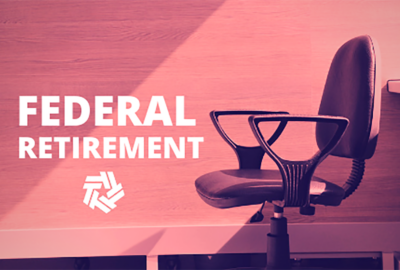

Hubbard Radio Washington DC, LLC. All rights reserved. This website is not intended for users located within the European Economic Area.
The push for ever-more productivity. The noodging to return to the office. the political comings and goings. The funding uncertainty. It's enough to convince so...
The push for ever-more productivity. The noodging to return to the office. the political comings and goings. The funding uncertainty. It’s enough to convince some feds it’s time to retire. But think about it first. There’s an opportunity cost to retiring. For more, Federal Drive with Tom Temin spoke with retired federal manager and financial adviser Abe Grungold.
Interview Transcript:
Abe Grungold Yes. If you’re thinking of retiring at the end of this year, there are a standard list of questions that I always suggest to my clients. And these ten questions are: Are you eligible to retire? Can you afford to retire? Are you allowed to keep your health insurance plan in retirement? Are you going to keep your federal long term plan in retirement? When are you going to be eligible for Social Security? When should you elect Social Security? How much life insurance are you going to need in retirement? What should you do about Medicare? Should you transfer your TSP to an IRA? And how do you handle your TSP with respect to withdrawals and inflation? So these are the ten topical questions that retirees or potential retirees need to think about before they start filling out their paperwork.
Tom Temin Now, it seems like the first consideration of the ten year eligibility would be the simplest.
Abe Grungold Well, it’s only simple for those people who have put in a significant amount of time in the government. You are eligible to retire if you reach your minimum retirement age, plus ten years of federal service. You must have that to obtain a retirement. You can have a deferred retirement. But when you select deferred retirement and you don’t have your MRA, you can lose a lot of your available benefits.
Tom Temin And with respect to your keeping your health insurance under the federal employee health benefits plans and your long term care insurance that you might have had through the federal plans, what’s a good source of information for determining what you can keep and what you can go forward with?
Abe Grungold Well, that’s a good question. With respect to health insurance, a lot of people carry their health insurance through their spouse. So before you retire, you need to ask your spouse what are their insurance, availability and retirement, the cost of it and how far away are you going to be to Medicare? So it’s really a dollar and cents issue. So you need to research that out on the OPM website on the Medicare.gov website. Now, with respect to long term care insurance, the best thing to do about long term care is to hang on to it if you have a policy. Because long term care is getting exceedingly expensive as we age. My mother was in a nursing home and she had to pay $150,000 per year in a nursing home. So if you have a long term care policy, hang on to it if you can afford it. A lot of people can’t afford one. And that’s, again, a dollar and cents issue.
Tom Temin And the question of Social Security and when to elect it for FERS employees. And those that came later or that might have come to the government mid-career and didn’t have an entire federal career. They’re all eligible for Social Security, although I know a few CSRS people still haven’t quite retired yet. But for those people that can get Social Security after government work that when to elect always elicits a lot of debate when people talk about it. Some people say, take it now. You don’t know how long you’re going to live. Why leave it on the table? Others say, well, I presume I’m going to live long enough such that the monthly payment is much bigger if I wait longer. How do you know the right answer there?
Abe Grungold Well, that is a very complicated question. Even for myself, it was a complicated issue, Tom, because when I retired, I had some health issues and I decided to submit my retirement application at the age of 64. Now, my wife stopped me and she said, Abe, why don’t you take it as full retirement and let me take it early and that way, I hate to say, if something happens to me, my wife would get the higher of the two. So that was a strategy that we as a married couple discussed, and I thought it was an excellent idea. And here my wife pointed something out to me and I withdrew my social security application. So you really have to look at your budget. Do you need Social Security now to pay your bills? Are you healthy? And if you’re healthy, maybe you can hold off on Social Security. And the other big issue is do you plan on still working after you retire? So if you’re working, you really don’t want to take Social Security. You want to hold off on that.
Tom Temin Or if you’re working, say, part time for half of what you earned earlier, then you may want to.
Abe Grungold Yes, if you’re working part time, there is a dollar amount, I believe it’s $21,560 that you can earn without losing any Social Security benefits. And yes, working part time is a good strategy in retirement, it keeps you busy, keeps you active. It provides a source of income, and you don’t have to lose any Social Security. I believe it’s $21,560.
Tom Temin And if you go above that, then Social Security diminishes. But does it go back up again once you fully retire?
Abe Grungold Well, if you fully retire, then no, your Social Security would stay the same. You just get the COLAs for each additional year that you age. But no, if you’re getting Social Security at age 62 and you’re working part time, you can earn up to $21,560, there’s no reduction. But certainly after the age of 67, you can earn $1,000,000 a year and you’re not going to lose any of your Social Security.
Tom Temin Well, that’s a relief because I got that personal question myself. We’re speaking with Abe Grungold. He’s a retired federal manager and now does financial, I guess you could say life coaching, because life coaching is probably right next door to financial coaching and the withdrawal strategy. I mean, that’s what really I think worries a lot of people because that’s your principle. And so you want to make sure you know that the principal is growing, even if you take the return from it the nest egg. That’s everyone’s big question.
Abe Grungold Yes. Well, this is a tough question because as a TSP participant, I am still in the TSP even though I am retired. And you need to invest your TSP somewhat aggressively to handle the monthly withdrawal amounts that you’re making as well as inflation. So you don’t have to be fully aggressive, you need to be somewhat aggressive in your retirement years and you can have a sizable monthly withdrawal. And if you’re somewhat aggressive, that growth will sustain itself. Your TSP should never diminish as you are in retirement years. And for me, even though I have a long term care plan, my long term care plan will be exhausted after two years. My war chest for a nursing home is my TSP. So that’s where I’m going to pay for those nursing home years. Is my TSP.
Tom Temin Sure. Or else you can hope to have enough dementia that you don’t know you’re in a nursing home.
Abe Grungold Unfortunately, yes. As long as you know that you have the ability to pay for your nursing home care. And it’s also a good idea when you get on in years is to establish an estate plan so someone is paying those bills in the event you are not able to make your own financial decision.
Tom Temin So let’s get back to that original question you mentioned, and that is the opportunity cost of retirement. That seems like a big part of the equation and probably your lifestyle and what you plan to spend and spend it on too. That’s the other side of this besides all of the income questions.
Abe Grungold Well, the opportunity cost used to be something that I used to hear from federal employees who are much older than I was at that time. And they were retiring and they had all these grand plans of what they were going to do a retirement. And let’s say you are earning $100,000 a year as a federal employee, okay? And you’re going to get a $40,000 a year pension. Now, say you just want to have a mindless job in retirement. You want to work at a flower store or you want to work at Home Depot, you want to work part time or whatever, and you’re earning $40,000 a year. Well, now you’re earning $80,000 a year. You could be working full time in retirement, working in a flower store at Home Depot, and you’re working full time. You’re losing $20,000 a year by doing that. Now, a lot of people work remotely. They want to teach English to people remotely. Okay, fine. You’re earning that $40,000 a year teaching English. You are also getting a $40,000 pension. You’re losing $20,000 a year and you no longer have that government computer. You have to go out, buy a computer now. You have to buy a headset. So there’s a expense to incur in order to do that part time job. And both jobs that I mentioned, you’re not getting the TSP matching a 5% and that was a loss of another $5,000. So you really have to understand what is it you’re going to do in retirement and how much you’re going to earn. And maybe it’s just a good idea to work an extra year or two, and you have to evaluate that opportunity cost.
Tom Temin And before we get complaints from the florists, it might be that you really like flowers, because flowers can be a very creative type of endeavor. So please, no complaints from florists. We love you. So the idea of working another year, but that predisposes the idea that you like your work because a lot of people just burnout, maybe.
Abe Grungold Yes, that’s true. I had a friend of mine, a very close friend of mine. He was a federal manager high up, and he had to retire to take care of his spouse, but he still wanted to keep busy. So he worked at Home Depot in the landscaping department. And he did it just for the physical aspect of it, and he enjoyed it. And I said, that’s a wonderful idea. You stay busy, you’re working and you enjoy what you’re doing. Yes. People get burned out. And government jobs are very tough, especially these front line jobs that people just don’t want to do anymore. They can’t tolerate it. So it is difficult. I actually had a great government job. I worked remotely, but I was a lucky person.
Copyright © 2024 Federal News Network. All rights reserved. This website is not intended for users located within the European Economic Area.
Tom Temin is host of the Federal Drive and has been providing insight on federal technology and management issues for more than 30 years.
Follow @tteminWFED


